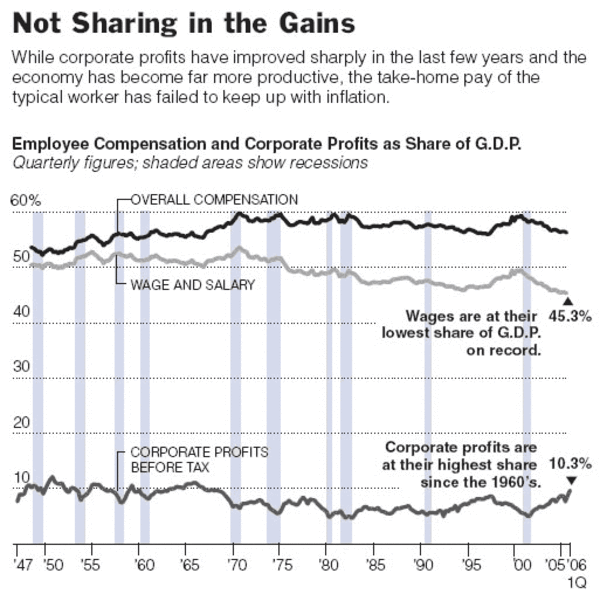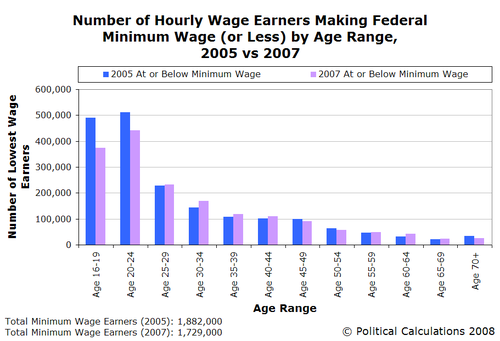I really wasn't going to post again on immigration - I've said what I have to say and I want to move on before I get too tedious on the subject. However, I was reading several conservative blogs over the last several days that had a lot of fun pointing out odd signs and screwball supporters of immigration in the recent immigration marches, as a way to mock the those who support immigration (example here).
I agree that immigration supporters have adopted some fellow travellers that they would do better without, particularly the hard-core Marxist remnants who not accidently chose the traditional Marxist-Soviet May Day holiday for their march.
However, I guess two can play at this game. I would like to walk through some of the key points from a recent emailer to this site. Below I will address a few of the best passages, but I have included the email in its entirety in the extended post, per the email's instructions. Really, I encourage you to read the whole thing. Every paragraph is priceless.
Being born with our rights is fine, HOWEVER the right to live in a PARTICULAR country within a FORMED AND STRUCTURED society of laws that protects those rights IS STRICTLY for THE "CITIZENS" who built that society TO DECIDE who may join them.!
I will call this the nation-as-country-club theory of government. Basically he is saying that the US is a big country club where most of us get our memberships by inheritance, and we all get to chose the few new members we take in each year. Of all the theories of government, this is, um, cetainly one of them. If anything, it reminds me a little of Heinlin in "Starship Troopers" with a society where only those who completed military service are full citizens.
This is, however, not the theory of government that our country was built on. In fact, we didn't have any real immigration restrictions in this country for over 100 years after the Contitution was passed. This model actually has strongly socialist implications. I will demonstrate that next...
Liberal Democrats AND SO CALLED LIBERTARIANS (who are really
displaced commis) will come to be known as the morons who killed the
goose trying to get the gold faster!!!!
Wow! All along I thought I was a libertarian anarco-capitalist and come to find out I am a displaced commie! Who knew?
Let's take an example. Lets say a person from Mexico wants to rent my house and then go to work for me in my business here in Phoenix. I believe that I should be able to rent my house to whomever I want and employ whomever I want without government interferance. The emailer presumably believes that the government should be able to dictate who I can and can't rent my property to, and whom I can and can't employ in my business. Who is the real socialist here? I want to let people go wherever they want, and the emailer presumably wants checkpoints demanding to see your paperwork. Which model looks more like Soviet Russia?
Recently the Arizona state goverment has discussed making it a crime of trespassing for a foreignor to be found anywhere in Arizona without the proper government paperwork. This law would dictate that if I have a such a foreignor on my property, he is trespassing. But he has my permission to be on my property, so how is he trespassing? The only way he can be trespassing is if one assumes that the government, and not me, ultimately own my property.
Of course, half the emails I get still say "but they are illegal - they don't have rights." OK, here is my counter-example. Tomorrow, Congress passes a law that says "No one is allowed to criticize any sitting member of Congress for any reason." What would you do? I would run to my blog and immediately start posting "Trent Lott sucks; John McCain sucks; Hillary Clinton sucks" etc. etc. Why -- because I still have the right to free speech, even if Congress makes it technically illegal. Laws and acts of Congress don't change rights. And if you believe that your rights do flow from Congress, then, well, we better all hold on because we are screwed.
America and the culture it has developed breeds predominantly decent people, these decent people have died to make America (and the world) a better place to live and little by little the world has learned from us and has begun to change for the better.
Now very silly people act like all the filth sickeness and desease of the world should be welcomed into america? No No No!!!!
American society and its culture of law abiding decency must not be overcome by the selfish unwashed unlawful hordes who would come here and destroy what has taken so long for so many to build!!!
This whole cultural assimilation thing always rings hollow for me. The very timeframe that folks like this get misty-eyed about when this country was built was a time of massive and nearly unfettered immigration. If you really are concerned about preserving America's traditions and culture (assuming "culture" isn't being used just as a code word to keep non-WASPs out) then I would think you would be strongly pro-immigration. Immigration is the norm in this country's history, and the current policies are the aberation. If you really want to live in a country where the government actively defines its role as maintaining the country's culture intact, then you should go to France.
My family, which came over early in this century, was poor, unskilled, and German. What could be worse from a "cultural" standpoint? Surely few could argue that for the period from 1875 to 1945 the Germans had one of the top 3 most destructive cultures in the world. Why would we ever want poor unskilled workers from a militaristic totalitarian culture? But my family was accepted none-the-less.
By the way, the corruption of our rights and freedoms and government is not coming from the outside - because we already did it to ourselves. In our original Constitutional framework, government was extremely limited and there was little it could do to influence lives. In the last 70 years, we have corrupted this framework, trashing Constitutional protections and limitations on government and replacing them with a tyranny of the majority, where 51% can do unto the other 49% in any way they please. We shot ourselves in the foot before most any current illegal immigrant was even born.
Latinos must be stupid since they dont even have the sense to adopt america!! Illegals still want to be known as mexicans!!! You know those silly stupid gutless mexicans who allow corruption and filth to be a way of life in mexico??
We fought and died to eliminate that in America but you want to let it back in here??
Wow, I am getting emails from people who have already died! Anyway, have you ever been to Boston on St. Patricks Day? The Irish still show a lot of pride in their mother country but they still also consider themselves Americans. The Irish are a great example -- Easterners in the 19th century rioted in protest of unskilled Irish immigration, but today they are part of the backbone of that American culture you get so misty-eyed about.
Mexican culture and traditions are one of the things that make Arizona great. Cinco de Mayo, for example, is a lot more fun than many of our American holidays and many of us anglos have adopted it in the same way most non-Irish have adopted St. Patricks Day. I am not particularly religeous, but for you conservatives out there I will offer that Mexicans are far more religious than your average American outside of the South.
Oh, and by the way, aren't these "stupid, gutless" Mexicans you don't like actually risking life and limb and arrest to escape the corruption of their home country?
I hope the first victim of a desease from aN ILLEGAL mexican who was never vaccinated is someone you CARE ABOUT!!! jerk!!!!!
Whoa, you say. This guy doesn't represent me! Well, I'll tell you. I have watched over the last several weeks as conservative blogs have spent a good amount of time picking out the most extreme and unbalanced immigration supporters and using them to mock the pro-immigration position as a whole. Turn about is fair play.
Update: I got a second email substantially similar to this one (but with slight variations) from a different email address today, so this is either copied from another source or part of some campaign. It could even be a mis-direction campaign by immigration supporters, though I doubt it because it is so dead on the tone and content of many other emails and comments I get.
Continue reading ‘One Last Immigration Post’ »









